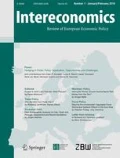Abstract
Traditional views of security policy have focused almost exclusively on defence and military topics. The process of transition in eastern Europe makes it necessary to take a much broader approach in which, for example, areas such as economic and social policy, or world trade and monetary relations, are included.
Similar content being viewed by others
References
Cf. G. Nonnenmacher: The Future of the North Atlantic Alliance and its Offer of a Partnership for Peace, in: Deutschland-Magazine, No. 3, 12/93, p. 10.
Cf. J. Chipman: The Nature of Grand Strategy and the Causes of Today's Strategic Arthritis, paper presented at the “Seminar for Security Policy 1994” held by the Federal College for Security Policy Studies in Bad Honnef, Germany, April 1994, p. 2.
Cf. D. Wellershoff: Sicherheitspolitik und Strategie—Das Zielsystem unseres sicherheitspolitischen Handelns, paper of introductory remarks presented at the “Seminar for Security Policy 1994” held by the Federal College for Security Policy Studies in Bad Honnef, Germany, April 1994, pp. 7–10.
Cf. Foreign Trade Research Institute: Poland in the World Economy in 1992 and 1993, Warsaw 1993.
Cf. C. Mascher: Ukraine—Im freinn Fall, Focus 11/1994, p. 250.
Cf. European Bank for Reconstruction and Development: Current Economic Issues, London 1993, country study Russia.
Cf. C. Bell, R. Götz: Regionale Wachstumspole und Wirtschaftsreform in Rußland, BIOst—Aktuelle Analysen, No. 6/1994.
Cf. J. Chipman, op. cit. The Nature of Grand Strategy and the Causes of Today's Strategic Arthritis, paper presented at the “Seminar for Security Policy 1994” held by the Federal College for Security Policy Studies in Bad Honnef, Germany, April 1994, pp. 16–17.
Cf. S. M. Collus, D. Rodrik: Eastern Europe and the Soviet Union in the World Economy, Institute for International Economics, Policy Analysis in International Economics, No. 32, May 1991, p. 123.
Cf. H. H. Höhmann, C. Meier: Systemic Transformation in the East of Europe—Tasks, Risks and External Aspects, Berichte des Bundesinstituts für ostwissenschaftliche und internationale Studien, No. 4, 1994, p. 36.
Cf. R. L. Tökes: Towards a New East-West Divide? Reflections and Policy Dilemmas; in: A. Clesse, R. L. Tökes (eds.): Preventing a New East-West Divide: The Economic and Social Imperatives of the Future Europe, pp. 502–507, here p. 503.
Cf. N. Mögel: Die gescheiterte Hoffnung—“Rüstungskonversion” in Rußland, Hamburger Beiträge zur Friedensforschung und Sicherheitspolitik, No. 79, Institut für Friedensforschung und Sicherheitspolitik an der Universität Hamburg, Hamburg 1993.
.
Cf. Presse- und Informationsamt der Bundesregierung: Stichworte zur Sicherheitspolitik, No. 5, May 1992, Bonn, p. 23.
Ibid. Cf. Presse- und Informationsamt der Bundesregierung: Stichworte zur Sicherheitspolitik, No. 5, May 1992, Bonn, p. 23.
Cf. P. Opitz: Chancen regionaler Rüstungskonversion in Rußland, Berichte des Bundesinstituts für ostwissenschaftliche und internationale Studien (BIOst) No. 39, Cologne 1993, p. 3.
Cf. K. Schrader: Die volkswirtschaftliche Bedeutung der Rüstungskonversion in der Sowjetunion, in: Die Weltwirtschaft, No. 1, 1991, pp. 166–179, here p. 175.
Cf. R. Götz: Die Wirtschafts- und Gesellschaftsstruktur der Sowjetunion als Hypothek für die Systemtransformation in Rußland, Berichte des Bundesinstituts für ostwissenschaftliche und internationale Studien (BIOst), No. 8, Cologne 1994, p. 15.
Cf. A. Heinemann-Grüder: Konversionschaos in Rußland, Probleme des Übergangs von der Rüstungs- zur Zivilproduktion, Blätter für deutsche und internationale Politik, No. 3, 1993, p. 332.
Cf. N. Mögel, op. cit..
Cf. P. Opitz, op. cit..
Cf. K. Hirschmann, E. A. Hirschmann, O. F. Bode: Internationalisierung und die osteuropäische institutionelle Integration: in: K. Hirschmann, E. A. Hirschmann, O. F. Bode (eds.): Weltwirtschaftliche Anpassung und Öffnung der osteuropäischen Reformstaaten, Berlin 1993, p. 11.
Cf. K. Hirschmann: Veränderung der Außenhandelsstruktur und technologisches „catching-up” im Transformations- und Internationalisierungsprozess Polens, in: K. Hirschmann, E. A. Hirschmann, O. F. Bode (eds.), op. cit. Weltwirtschaftliche Anpassung und Öffnung der osteuropäischen Reformstaaten, Berlin 1993, pp. 99–134.
Cf. D. Wilkes, M. Deffrennes: Co-operation with the former communist countries in nuclear technology—the need for standardisation and quality management, in: Kernkrafttechnik, No. 58/6, December 1993, pp. 338–341, here p. 339.
Ibid. Cf. D. Wilkes, M. Deffrennes: Co-operation with the former communist countries in nuclear technology—the need for standardisation and quality management, in: Kernkrafttechnik, No. 58/6, December 1993, pp. 338–341, here p. 339.
Cf. OECD: Reforming the Economies of Central and Eastern Europe, Paris 1993, Annex 3—Environmental issues, p. 97.
Cf. M. Welfens: System Transformation and Environmental Policy—Problems and Options in Cental and Eastern Europe-, in: INTERECONOMICS, 1993, Vol. 28, No. 5, pp. 231–240, here p. 235.
Cf. Federal Ministry of Defence: White Paper 1994, Bonn 1994, p. 56.
Ibid. Cf. Federal Ministry of Defence: White Paper 1994, Bonn 1994, p. 56.
Author information
Authors and Affiliations
Rights and permissions
About this article
Cite this article
Hirschmann, K. The transition process in Eastern Europe: European security policy redefined. Intereconomics 30, 44–52 (1995). https://doi.org/10.1007/BF02926361
Issue Date:
DOI: https://doi.org/10.1007/BF02926361




